Becoming a detective is a dream for those who grow up watching detective and serial movies. After knowing the character of Sherlock Holmes, we assume to be like him. However, somewhere along the way, we forget this dream of ours and work towards more “realistic” goals. In recent years, due to the increased rate of crime, there is a greater need for detectives to solve them. This is the reason why some police officers are trying to be like Sherlock Holmes. You will find some information about being a detective if you still want to become one.
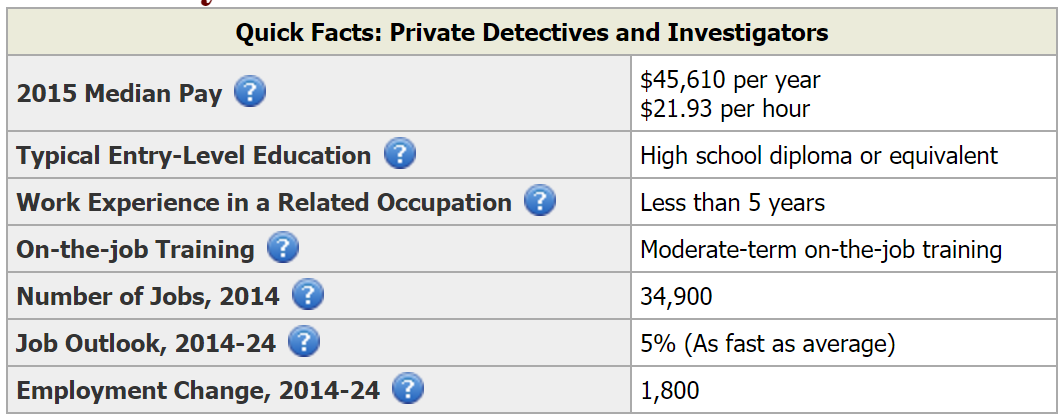

Table Of Contents
- Average Detective Salary
- Detective Career Outlook
- How To Become A Detective
- Detective Job Description
How Much a Detective Earns
The base salary of a detective first depends on his or her employer. In most circumstances, a state employed investigator earns more than a private one. This is because a private detective has intermittent work while the state employed has a steady work. A state employed detective earns a national average of $76,000. For a private detective, he or she can earn about $45,000. We shall discuss factors affecting a PI’s salary later. Here are the factors that affect the salary of investigators that are state employed.
[asd_program_button /]Size of population
Like police officers, the population of a city decides the income of a detective. If the city is more populated, then the number of cases that need to be handled also rises. In this case, the salary will increase. Similarly, crime rate also plays a major factor in deciding the salary of an investigator. For example, the average salary for someone in the LA police department ranges from $44,000 to $88,000. Whereas, a member of the Miami Police department usually get $86,000 to $107,000 salary.
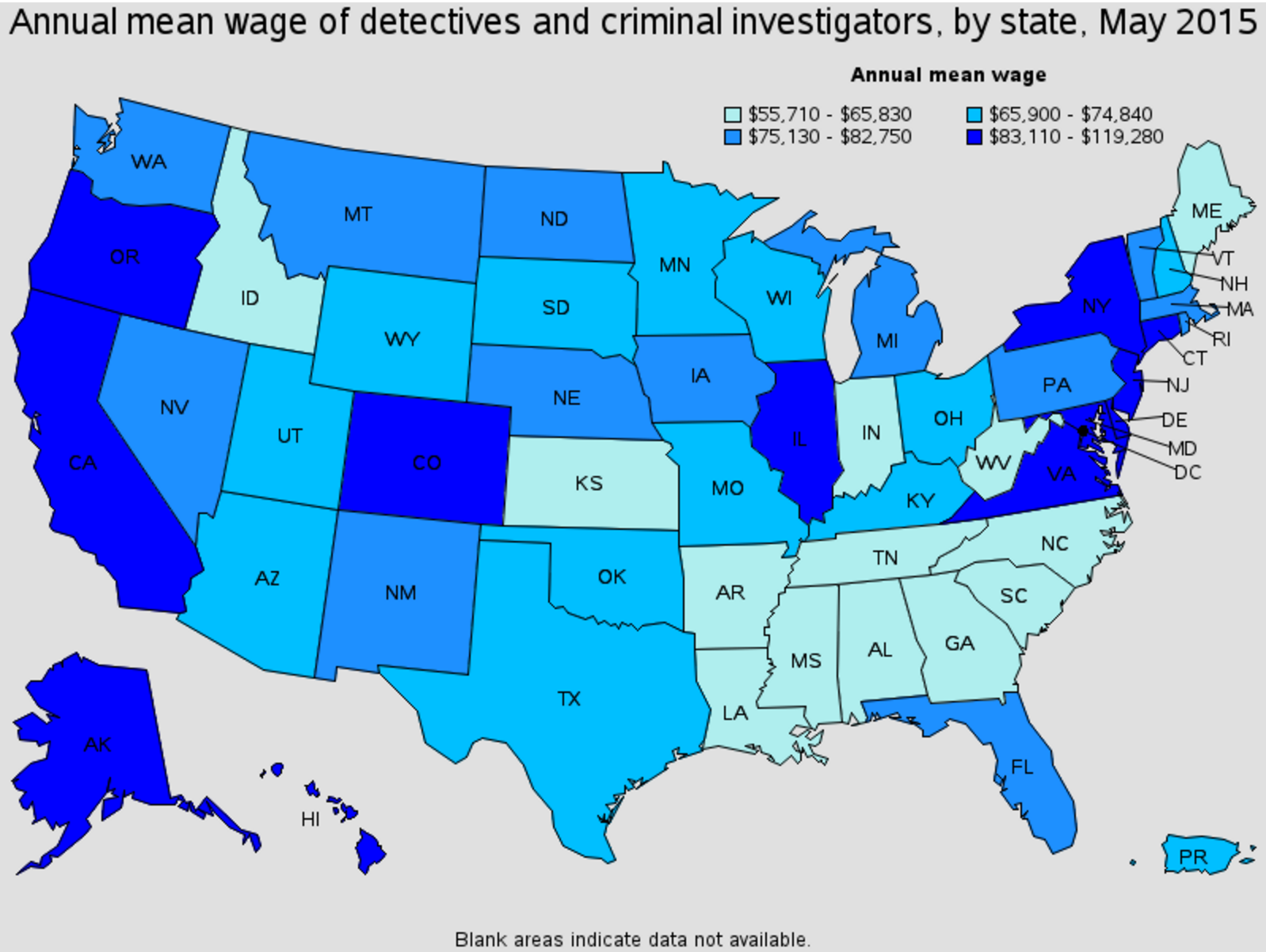
Place assigned or working
The location is closely related to the population of the place and the crime rate. However, cost of living is another factor to consider. Higher the cost of living in a certain location, higher the detective is paid. Private investigators will also have this case. District of Columbia, Alaska, and New Jersey has 6-figure salaries and District of Columbia can pay as much as $116,000.
Educational degree
For any police job (except at the federal level), a high school degree is sufficient. This rules do not apply in all states but higher education certificates are not required in most states. However, some states and departments have started to realize the importance of higher education and thus are paying officers and detectives a percentage higher above the base pay if they have a degree after high school. This can be an associate, bachelor or a master’s degree. Depending on your degree, you might be paid more.
Work Experience
Your length of stay in the field will be a consideration on how much you will earn as an investigator. Usually, people see an increase of up to $15,000 with 20 years of experience if they do not get promoted. However, with promotions, if you reach the post of Police Chief, you can earn about $180,000 annually.
Bluff Private Investigators
A private investigator’s salary depends on the number of cases he or she takes and solves. The location, amount of discretion needed, amount of danger involved, required extra equipment and other many things are the factors mentioned above that can affect the price. Clients usually present their problem to the investigator and then it is up to them to quote a price for the job.
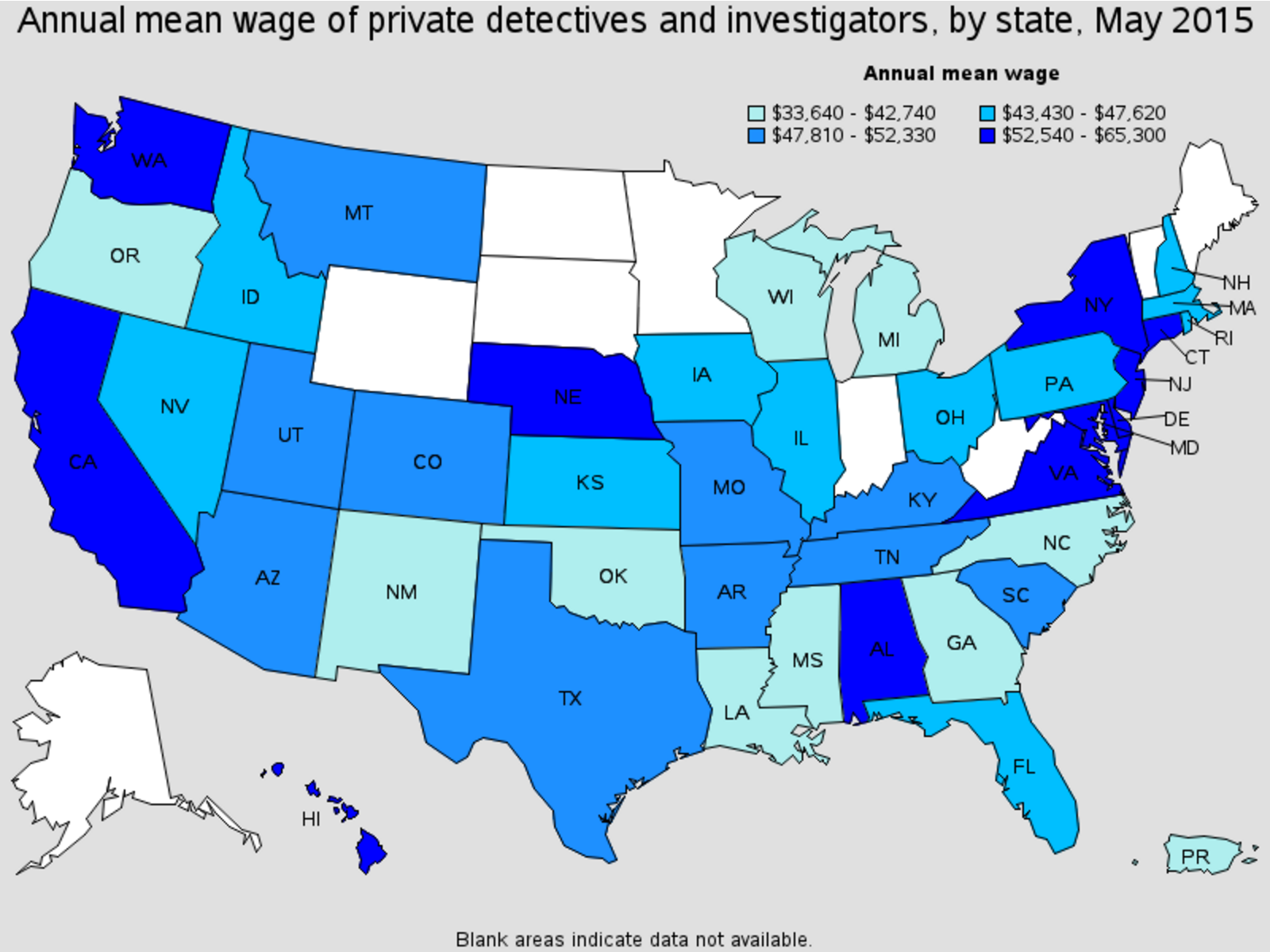
A state-employed detective has a steady income that will increase by various means as described here. On the hand, the salary of a private investigator is quite unpredictable and can only be increased by fame (or rather being more discrete). Now that you have the financial facts, you can decide which path to choose.
Bluff Detective Career Outlook
First, let’s talk about the growth in the fields. There were about 106,000 public detectives or criminal investigators on record in 2015. On the other hand, there were only about 30,000 private investigators holding a job at the same time. In this industry, the predicted growth of private detectives is about 15%. This goes to show that by 2025, 1,500 new jobs will be opened. This growth rate is following the average growth rate of 5% across all other sectors. On the other hand, for public investigators, this figure is at 4%. Meaning to say, in 2025 it is expected that there will be 4,000 more jobs as a criminal investigator. This too is an average rate of growth.
[asd_program_button /]The steady increase in employment is mainly due to the increase in population. Protection should be done to a lot of people and more criminals should be caught as the population increases. Crime rate is not increasing significantly due to stricter laws and more advanced technology being used. Because of this, both the phenomena are just the same leading to average growth in each career.
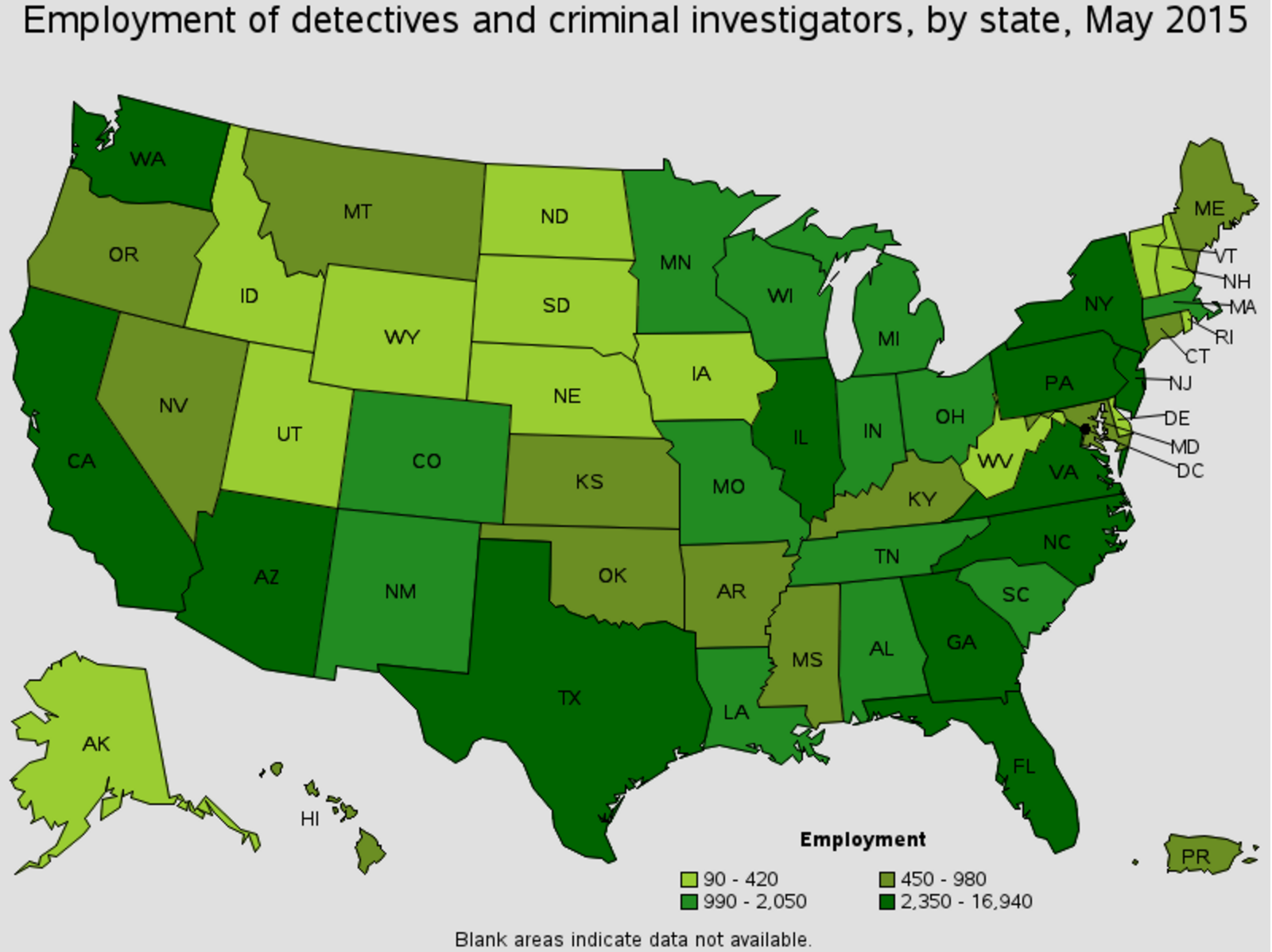
The highest number of Criminal/Law Enforcement Investigators are found in Texas, California and New York. There are more employments in Western states and Texas compared to the eastern part. There are a lot of private detectives hired in California, Texas and Florida with the southern states compared in the northern part.
Let’s move on to the industries that hire most of these two professionals. Criminalinvestigaors are being hired mostly by The Local, State government and the Federal branch. Whereas private detectives are being hired by Security Services, Consulting services and the local government for consultation purposes on a few cases.
Criminal investigators get higher payments than the private ones. Criminal investigators receive $80,000 as average salary annually while Private investigators earn $52,000 only. When combining the aspects of geography and finance, the District of Columbia, Alaska, and New Jersey is paying most the Public investigators. Private detectives receive higher payment in Alabama, Nebraska, and New Jersey.
Compared with the different industries, private industries where they employ most do not pay the highest. Private detectives are paid most in Electromedical, Navigational, Power generation, Metal Product forming and other such industries because of the most sensitive information that needs to be protected. Federal agencies, postal services, and educational institutes are paying public investigators most.
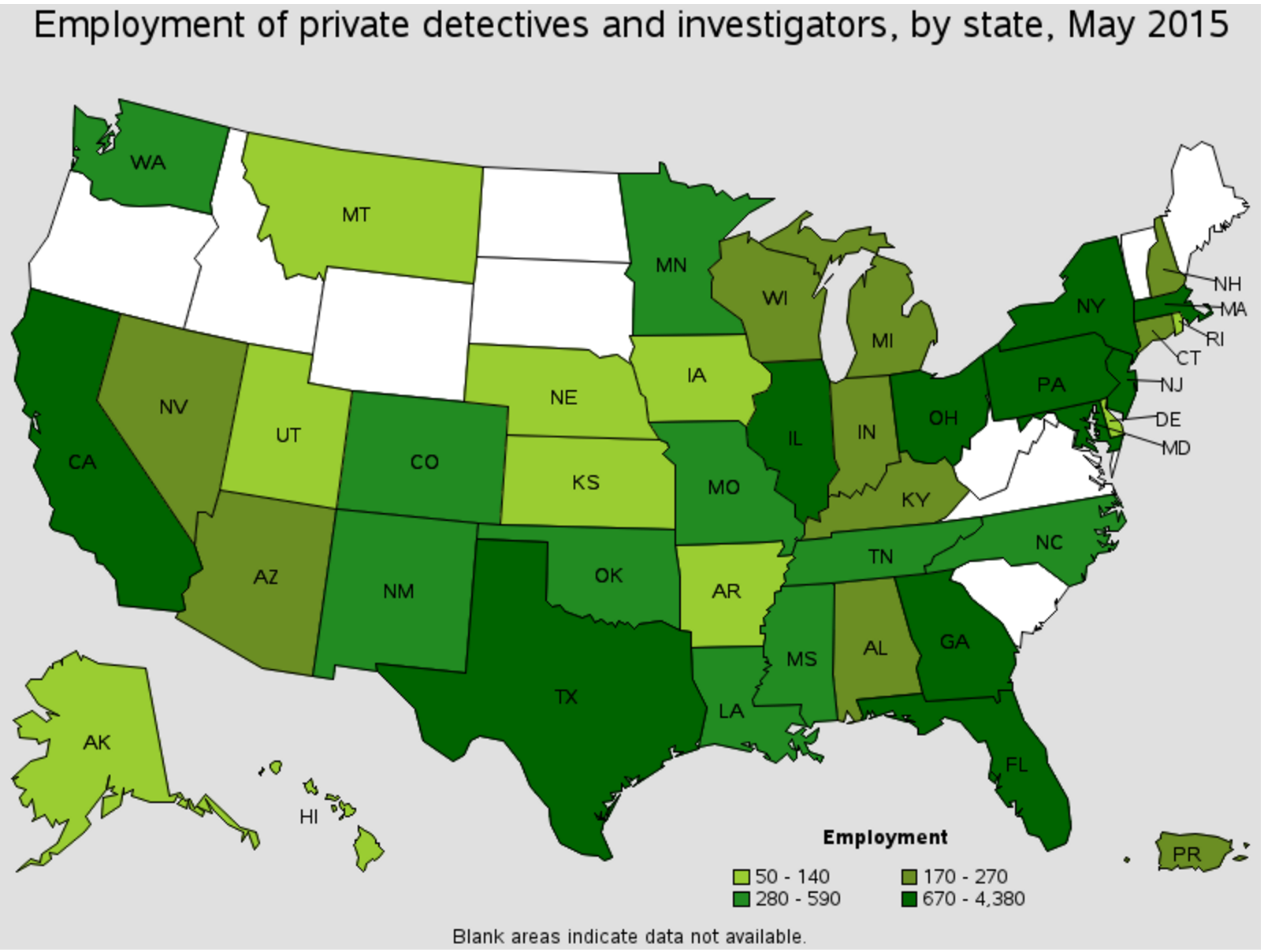
How To Become A Bluff Detective
Keep in mind that there are two kinds of detectives. General public can hire some private investigators to investigate certain things. There are those who are government employees and after being promoted as a police officer gets the post. Here we shall explore both the avenues.
[asd_program_button /]Complete High School
Due to excellent deduction skills, a deductive is able to take a leap from a police officer to a detective position. Thus, a general way in becoming a detective is to first complete high school and get into the police academy to become a police officer. Becoming a private investigator would mean getting a high school degree.
Get your Bachelor’s Degree
Usually, you don’t require a bachelor’s degree to get into the police academy. Although some officers would like to have other means of employment right after retirement. However, if you aspire to be a detective or land a job on federal level, you will need a bachelor’s degree.
In most institutions, you will need a bachelor’s degree in psychology, law, or criminal justice to be able to land a job as a detective. If you have an associate’s degree, you will need at least 5000 hours. On the other hand, someone with a bachelor’s degree needs only 4000 hours of training.
Get the right amount of experience
Professional experience as an investigator is required in order to become a professional detective. There are many ways to get this. However, the most common way is to be employed by the government first. You will be regarded as a person with experience if you worked as a criminal investigator or an arson investigator. However, you can also choose to work as a licensed repossessor or office investigator.
The experience required might vary from one state to another. A state might require at least 3 years of experience, but in some it could be as long as 5 years.
Acquire a license for your guns
Investigators that aren’t licensed by the state aren’t allowed to carry firearms without a permit. Some firearms will need you to undertake a full training course in order to get your permit. Therefore if you want to own a firearm while working as an investigator, completing the training course is necessary to get your own permit.
Obtain Utah licensure
A licensure test is required after you have all the requirements needed. The test will include questions regarded state laws and have multiple choices to choose from. This examination is only for aspiring private detectives. Once you pass, you will officially become a licensed private detective.
Get Utah Insurance
Since investigating can sometimes be a dangerous line of work, it is important to get insurance done. Basically, this is a medical insurance worth $10,000. But since you’re carrying a gun with you for extra protection, and you will have to insure the gun as well, getting a higher amount will be an ideal choice.
By completing these steps, you’ll be good to go. You can now start living the detective life you always wanted. However, don’t forget that being a detective would mean exposing yourself to danger. If you are still up for it, find out all the education requirements in detail and get started on them right away!
Responsibilities of Being a Detective in Bluff
Crime Scene Investigation
It will be a detective’s duty to carefully assess a crime scene and come up with the most sensible deduction. He will then collect any evidence he can find in the crime scene. They will need to keep anything suspicious that might lead to solving the case. Sometimes the forensic investigation department lends them a hand in analyzing the evidence and thus helping them deduce more things about the crime. They are also supposed to go door to door and gather more evidence from eye witnesses or search for cameras wherever they might be installed.
[asd_program_button /]Criminal Research
Doing research regarding previous cases is regarded as an important aspect of a detective’s job. This is so that they can have an insight regarding criminal patterns and behaviors. In most cases, this will mean researching into previous records for them to know how the culprit might operate. Research is definitely of great help when it comes to tracking down serial killers. This is also applicable when it comes to knowing what tactics a drug cartel is up to. Other general research can help them narrow down a suspect better or deduce the crime scene in a more efficient way.
Reducing the list of possible suspects
The whole objective of everything that a detective does is to serve justice to the person who has committed the crime. But to do this, they first need to a list of possible suspects. The list could be long, including up to a hundred people, or short – sometimes none at al. They are able to come up with such list by piecing evidences, statements from eye witnesses, results from research, and a bit of forensics altogether. By means of getting statements from suspects, detectives are able to narrow down their list. Once the list is narrowed down, they will then proceed to gathering evidence or having the suspect admit to his crimes.
Testifying In Court
Lastly, detectives will see to it that justice is served properly. To hasten the process, the court will sometimes summon them. In some cases, they will describe the evidence and how they are connected to the suspect, as well as narrating the possible crime scene. Sometimes, the detectives are also required to escort the culprit to jail.
Bluff Private Detectives
Basically, the above mentioned roles are the responsibilities that detectives carry. Keep in mind that the job of a private detective isn’t as easy as it seems. Supposedly, detectives should meet their client’s needs regardless of how difficult it might seem, especially in terms of research. However, they are allowed to only bend certain laws to a minimalistic extent to help them complete their duties. Some of the reasons why private detectives are hired include doing background checks, tracking finances, and even collecting clues and evidence to be used against a certain person. They should never act in a way that they can be easily recognized as a detective in public. They are however, not allowed to arrest anyone.
As you can see, the “Idiot Box” was right for the most part. The thing is, the duties and roles detectives undertake every single day are very stressful. Such things aren’t even shown on the TV. They are always supposed to look over their shoulder and ensure they do not miss any single clue since lives literally depend on them. If you’re really interested with the job, you should start knowing what it takes to be a detective now!
